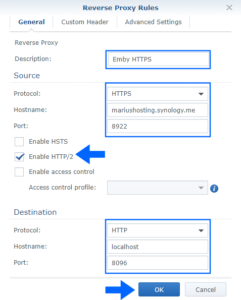

#Emby client docker full
Learn more with this interactive tool:ĭownload the full report: Containers in the enterprise (PDF, 1.4MB) Why use Docker?ĭocker is so popular today that “Docker” and “containers” are used interchangeably. This can reduce cloud spending.Ĭompanies using containers report other benefits including improved app quality, faster response to market changes and much more. Greater resource efficiency: With containers, developers can run several times as many copies of an application on the same hardware as they can using VMs. This makes them ideal for use in continuous integration and continuous delivery (CI/CD) pipelines and a better fit for development teams adopting Agile and DevOps practices. And compared to VMs, containers are faster and easier to deploy, provision and restart. Improved developer productivity: Containerized applications can be written once and run anywhere. gigabytes for some VMs), make better use of hardware capacity, and have faster startup times. Container sizes are measured in megabytes (vs. They include only the OS processes and dependencies necessary to execute the code. Lighter weight: Unlike VMs, containers don’t carry the payload of an entire OS instance and hypervisor. These capabilities-such as control groups (Cgroups) for allocating resources among processes, and namespaces for restricting a processes access or visibility into other resources or areas of the system-enable multiple application components to share the resources of a single instance of the host operating system in much the same way that a hypervisor enables multiple virtual machines (VMs) to share the CPU, memory and other resources of a single hardware server.Īs a result, container technology offers all the functionality and benefits of VMs-including application isolation, cost-effective scalability, and disposability-plus important additional advantages: How containers work, and why they're so popularĬontainers are made possible by process isolation and virtualization capabilities built into the Linux kernel. (link resides outside ibm.com), the company that sells the commercial version of Docker, and to the Docker open source project (link resides outside ibm.com) to which Docker, Inc, and many other organizations and individuals contribute. At this writing, Docker reported over 13 million developers using the platform (link resides outside ibm.com).ĭocker also refers to Docker, Inc. But Docker makes containerization faster, easier and safer. It’s possible for developers to create containers without Docker, by working directly with capabilities built into Linux and other operating systems. They have become increasingly popular as organizations shift to cloud-native development and hybrid multicloud environments.

#Emby client docker update
What is Docker?ĭocker is an open source platform that enables developers to build, deploy, run, update and manage containers-standardized, executable components that combine application source code with the operating system (OS) libraries and dependencies required to run that code in any environment.Ĭontainers simplify development and delivery of distributed applications. Learn about containers, how they compare to VMs, and why Docker is so widely adopted and used. Docker is an open source platform for building, deploying, and managing containerized applications.


 0 kommentar(er)
0 kommentar(er)
